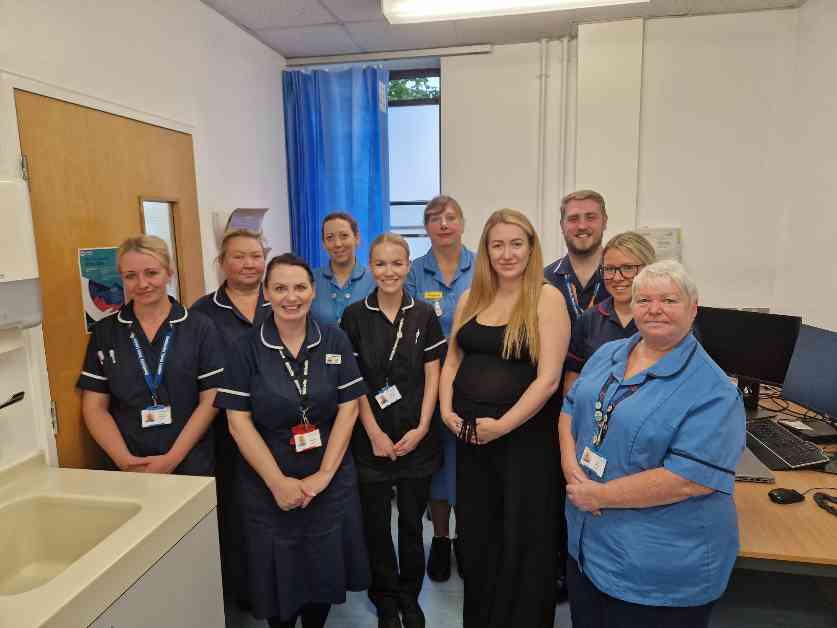Expectant parents in Warrington now have access to a new vaccine that can protect them and their unborn baby against a potentially serious virus. Respiratory syncytial virus (RSV) is a common virus that primarily affects the airways and lungs, causing symptoms such as coughs and colds. While RSV often resolves on its own, in some cases, it can lead to more severe illnesses like pneumonia or bronchiolitis.
The Impact of RSV on Babies
For babies, RSV can be particularly dangerous as it can cause inflammation and blockage of the small air tubes in the lungs. This can make breathing and feeding difficult, potentially leading to hospitalization for treatment. The severity of RSV in infants underscores the importance of preventive measures for expectant parents.
Maternal Vaccination for RSV
To address the risks associated with RSV, women who are 28 weeks pregnant or more in Warrington are now offered an RSV vaccine free of charge as part of their recommended maternal vaccinations. This vaccine works by boosting the antibodies in the mother’s immune system, which are then passed on to the unborn child through the placenta. By receiving the vaccine during pregnancy, expectant mothers can provide crucial protection for their babies during their most vulnerable stage of life.
Tildy Ashcroft, a specialist midwife for antenatal and newborn screening at Warrington Hospital, emphasizes the importance of the RSV vaccine in protecting infants from serious respiratory illnesses. Ashcroft highlights the prevalence of bronchiolitis and pneumonia among hospitalized babies, emphasizing the potential benefits of the vaccine in preventing such conditions.
Rachel Bibby, a midwife at the trust, shares her experience of receiving the RSV vaccine while pregnant. Despite being in the later stages of her pregnancy, Bibby recognized the benefits of the vaccine in safeguarding her baby’s health. Her proactive approach reflects the willingness of expectant mothers to take preventive measures to protect their children from potential illnesses.
Effectiveness of the RSV Vaccine
The RSV vaccine has shown promising results in reducing the risk of severe RSV by approximately 70% for infants from birth up to six months old. This significant reduction in risk underscores the importance of maternal vaccination in ensuring the health and well-being of newborns. The vaccine’s effectiveness in preventing severe RSV cases highlights its potential to alleviate the burden on healthcare systems and families dealing with infant respiratory illnesses.
Ali Kennah, the chief nurse at Warrington and Halton Teaching Hospitals, emphasizes the importance of maternal vaccines in protecting newborns from preventable illnesses. Kennah stresses that RSV is a preventable illness, and the new vaccine offers substantial protection against severe outcomes. Encouraging expectant parents to take advantage of the available maternal vaccines, Kennah underscores the role of vaccination in safeguarding the health of both mothers and their babies.
Global Approval and Implementation of the RSV Vaccine
The approval of the RSV vaccine by medicines regulators in the UK, Europe, and the USA signifies its safety and efficacy in preventing RSV infections. With thousands of women having received the vaccine in various countries, including over 100,000 in the USA, the global adoption of the vaccine highlights its potential to address the significant health risks posed by RSV. The widespread acceptance of the RSV vaccine underscores its importance in protecting vulnerable populations from respiratory illnesses.
Expanding Access to RSV Vaccinations
In addition to expectant parents, older adults aged 75 to 79 years old will also have the opportunity to receive RSV vaccinations as a ‘catch-up’ measure. This expansion of access to RSV vaccines aims to provide protection for older adults as the winter months approach, reducing the risk of severe respiratory infections. By broadening the scope of RSV vaccinations, healthcare providers can enhance the resilience of vulnerable populations against respiratory illnesses.
Promoting Awareness and Engagement with Maternal Vaccines
Promoting awareness of the RSV vaccine and other maternal vaccinations is essential in encouraging expectant parents to take proactive steps in safeguarding their health and the health of their babies. By engaging with healthcare providers, expectant mothers can gain valuable insights into the benefits of maternal vaccines and make informed decisions about their vaccination choices. Open communication with midwives and healthcare professionals can address any concerns or questions expectant parents may have, fostering a supportive environment for maternal vaccination initiatives.
Subheadings:




















